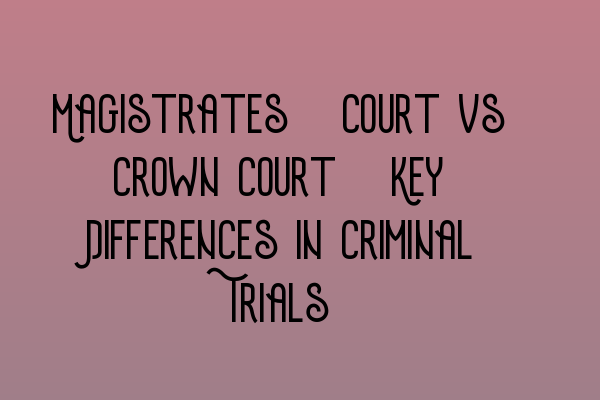Magistrates’ Court vs Crown Court: Key Differences in Criminal Trials
When it comes to criminal trials in the UK, there are two significant courts that handle different types of cases: the Magistrates’ Court and the Crown Court. Understanding the differences between these two courts is essential for anyone studying or working in the field of criminal law.
Magistrates’ Court: Overview and Jurisdiction
The Magistrates’ Court, also known as the lower court, is the first point of contact for most criminal cases. It deals with less serious offenses, such as minor theft, public order offenses, and some low-level driving offenses.
One of the key advantages of the Magistrates’ Court is its accessibility. It is easily accessible to the general public, ensuring that justice is delivered promptly and efficiently. Unlike the Crown Court, which requires formal legal representation, defendants in the Magistrates’ Court can choose to represent themselves, although legal advice is highly recommended.
Magistrates’ Court trials are usually heard by either lay magistrates or a District Judge, acting as a solo decision-maker. Lay magistrates are individuals from the local community who are selected based on their local knowledge and understanding of the society they serve. This aspect adds a sense of community involvement to the trial process.
Furthermore, trials in the Magistrates’ Court are typically shorter and less formal compared to those in the Crown Court. This allows for a more straightforward and expedited process for less serious offenses.
If the case being heard in the Magistrates’ Court is more complex or serious, it might be sent to the Crown Court for a trial.
Crown Court: Overview and Jurisdiction
The Crown Court deals with more serious criminal cases, such as murder, rape, and drug trafficking. Unlike the Magistrates’ Court, which has restricted sentencing powers, the Crown Court has the authority to impose longer prison sentences based on the severity of the crime.
One of the significant distinctions of the Crown Court is its structure. The cases here are heard before a judge and a jury. The jury, composed of 12 members of the public, is responsible for determining the guilt or innocence of the defendant based on the evidence presented during the trial.
In contrast to the Magistrates’ Court, legal representation in the form of barristers and solicitors is essential in the Crown Court. The need for formal legal representation adds expertise and professionalism to the trial process. Barristers specialize in advocacy and presenting the case before the court, while solicitors provide legal advice and handle the overall preparation of the case.
Trials in the Crown Court tend to be more complex and elaborate, often involving expert witnesses and cross-examination. The solemnity and gravity of the courtroom are evident, emphasizing the seriousness of the offenses being tried.
It is also worth noting that the Crown Court has the power to review cases that have been previously decided in the Magistrates’ Court. This allows for a higher level of scrutiny and the possibility of a different outcome.
Conclusion
Understanding the key differences between the Magistrates’ Court and the Crown Court is crucial for anyone involved in the criminal justice system. While the Magistrates’ Court handles less serious offenses with more accessibility and community involvement, the Crown Court deals with more serious crimes with a higher level of formality and expertise.
Whether you are a law student, a legal professional, or simply curious about the criminal justice system, educating yourself on these differences will enhance your understanding of how justice is served in the UK.
For more information on criminal practice and expanding your expertise, check out our Workshops and Seminars on Criminal Practice: Expanding Your Expertise. Stay informed and prepared with the latest updates in UK criminal laws by reading our article on Updates in UK Criminal Laws: Staying Informed and Prepared. Enhance your SQE Criminal Law study group experience with our tips and suggestions here. For a detailed analysis of criminal evidence rules, we have provided a comprehensive resource in our article on Decoding Criminal Evidence Rules: A Detailed Analysis. Lastly, learn about the legal protections and support available for victims in criminal procedures in our article on Ensuring Rights of Victims in Criminal Procedures: Legal Protections and Support.
